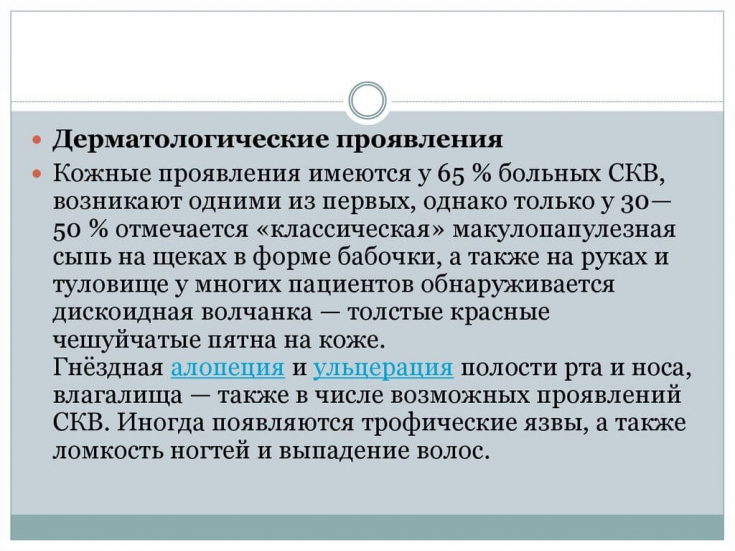To improve long-term outcomes, in patients with systemic lupus erythematosus (SLE), treatment should be directed at reversing symptoms and signs of the disease, minimizing drug side effects, and improving quality of life.
EULAR has conducted a systematic review of the literature and published updated guidelines for the treatment of patients with systemic lupus erythematosus.
In this publication on estet-portal.com we will consider the therapy that is prescribed for systemic erythematosus lupus without kidney damage.
- Peculiarities of treatment of lupus erythematosus during exacerbation of the course of the disease
- Hydroxychloroquine use for lupus erythematosus
- Glucocorticoids and immunotherapy for lupus erythematosusand
Peculiarities of treatment of lupus erythematosus in case of exacerbation of the course of the disease
Most experts believe that an exacerbation of systemic lupus erythematosus is an indicator of increased disease activity, which usually leads to a change in treatment.
Follow us on Instagram!
Risk factors for a high frequency of exacerbations of systemic lupus erythematosus include:
- youngest age at onset;
- no use of antimalarial drugs;
- sustained generalized disease activity;
- serological activity (antibodies to deoxyribonucleic acid (DNA), low complement
- ta).
Case-based post-acne treatment
Use of hydroxychloroquine for the treatment of lupus erythematosusHydroxychloroquine is recommended for the treatment of all patients with lupus erythematosus.
Several beneficial effects of the drug are known, but poor response to treatment is not uncommon.Hydroxychloroquine blood levels can be used to assess response, but data are not yet sufficient to recommend regular monitoring of this agent.
Concerns about
retinal toxicity of hydroxychloroquine in long-term therapy have led to more sensitive screening methods, with the prevalence of retinal anomalies exceeding 10% after 20 years of continuous use of the methods.

risk factors for retinopathy are:
- duration of treatment (odds ratio (OR) 4.71 for every 5 years of use);
- drug dosage (OR 3.34 for every 100 mg daily dose);
- chronic kidney disease (adjusted OR 8.56);
- existing retinal disease.
It should be noted that the effectiveness of hydroxychloroquine in systemic lupus erythematosus has been established in studies in which this drug was prescribed at a dose of 6.5 mg / kg / day.
It therefore remains to be confirmed whether a lower dose would produce the same clinical effects.
Hydroxychloroquine dosage may be reduced in patients in long-term remission, although no studies have formally addressed this strategyQuinacrine, an alternative antimalarial agent, may be considered in patients with cutaneous manifestations and hydroxychloroquine-associated retinal toxicity.
Glucocorticoids and immunotherapy for the treatment of lupus erythematosus
Glucocorticoids
may provide rapid relief of symptoms, but the mid- to long-term goal should be minimizing the dose to ≤7.5 mg/day, the equivalent dose of prednisolone, or stopping these drugs, as long-term glucocorticosteroid therapy can have negative consequences, including irreversible organ damage. Risks increase significantly with continued use of glucocorticoids at a dose of > 7.5 mg/essence.
Some researchers suggest that low doses may also be harmful.Diagnosis and treatment of actinic keratosis
Biological agents for the treatment of SLE
There is evidence to support the beneficial effects of biological agents targeting B cells in systemic lupus erythematosus.
Belimumab
should be considered in patients with SLE whohave no renal manifestations and who are poor disease control (prolonged disease activity or frequent exacerbations) to first-line drug treatment (usually including a combination of hydroxychloroquine and prednisolone with/without immunosuppressive drugs) and inability to reduce the daily dose of glucocorticoids to an acceptable level (i.e. maximum 7.5 mg/day).
 Due to the negative results of randomized controlled trials,
Due to the negative results of randomized controlled trials,







Add a comment